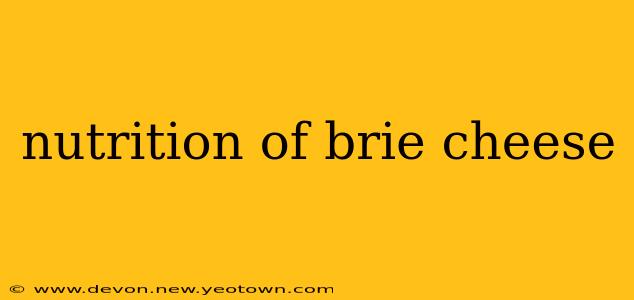Brie. Just the word conjures images of creamy, decadent indulgence, perfect alongside crusty bread and a crisp glass of wine. But beyond its delightful taste and texture, what's the nutritional story behind this beloved cheese? Let's unravel the facts, separating myth from reality and exploring the nutritional profile of this French classic.
What is the Nutritional Value of Brie Cheese?
Brie, like many cheeses, boasts a rich nutritional landscape. A typical serving (approximately 30 grams or about one ounce) offers a surprisingly good source of protein and calcium, essential for building and maintaining strong bones and muscles. It's also a decent source of fat, which contributes to its creamy texture and rich flavor. However, it's crucial to understand that the precise nutritional values can vary depending on the brand, the milk used (cow's milk is most common but goat's milk or sheep's milk brie also exists), and the aging process.
Is Brie Cheese High in Fat and Calories?
Yes, brie is relatively high in fat and calories compared to some other cheeses. The fat content primarily comes from saturated fat, which should be consumed in moderation as part of a balanced diet. The calorie count can also add up quickly, especially if you're enjoying a generous portion. However, it's important to remember that fat isn't inherently "bad"—it plays a vital role in nutrient absorption and overall health. The key is moderation and mindful consumption.
How Much Fat and Saturated Fat is in Brie?
The precise amounts of fat and saturated fat vary between brands and types of brie. Generally, a 30-gram serving will contain a significant amount of fat, ranging from 7 to 10 grams, with a substantial portion being saturated fat. Always check the nutritional information on the specific product you're consuming for accurate figures. Focusing on portion control is key to managing fat intake from brie.
What are the Health Benefits of Brie Cheese (if any)?
Despite its higher fat content, brie offers some potential health benefits. Its high calcium content contributes to bone health, making it a valuable addition to a diet for maintaining strong bones and preventing osteoporosis, particularly important for women as they age. The protein content aids in muscle building and repair. Furthermore, brie contains various vitamins and minerals, albeit in smaller amounts.
Is Brie Cheese Good for Weight Loss?
Given its calorie and fat content, brie isn't typically considered a weight-loss-friendly food. However, it doesn't need to be entirely excluded from a weight-management diet. Moderation is key. Enjoying a small portion as part of a balanced meal plan, rather than indulging in large quantities, can help you incorporate this delicious cheese without hindering your weight loss goals. Remember to focus on overall caloric intake and dietary balance.
Does Brie Cheese Contain Lactose?
Yes, brie typically contains lactose, the sugar found in milk. The aging process reduces the lactose content somewhat, but individuals with lactose intolerance may still experience digestive discomfort after consuming brie. Those with severe lactose intolerance should exercise caution and potentially opt for lactose-free alternatives if available.
What are the best ways to incorporate Brie into a healthy diet?
The best way to incorporate brie into a healthy diet is through mindful portion control and balance. Pair a small portion with a variety of nutrient-rich foods like fruits, vegetables, whole grains, and lean protein. Think of it as a special treat rather than a staple food. For example, a small wedge of brie on a cracker alongside a salad offers a balanced and delicious combination.
This exploration of brie cheese nutrition helps paint a clearer picture of this beloved cheese. While high in fat and calories, its calcium and protein content and delightful taste can be enjoyed as part of a well-rounded, balanced diet. Remember, moderation is key to savoring the pleasures of brie without compromising your overall health and well-being.

